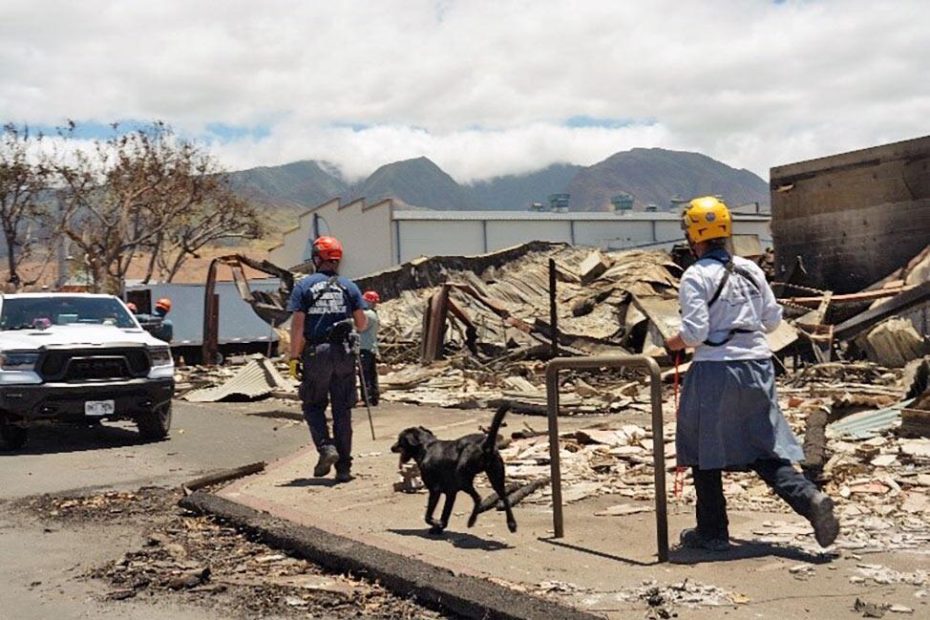On August 8, catastrophic wildfires swept across the Hawaiian islands of Maui and O‘ahu. The fires burned over 2,500 acres. They decimated the historic town of Lahaina not to mention countless landmarks and large sections of the Maui Upcountry. As of August 16, 2023, officials confirmed 106 deaths—a number expected to rise as search and rescue efforts continue. Now, according to the National Fire Protection Association, the Maui wildfire ranks among the top 10 deadliest U.S. wildfires on record since 1871.
Sadly, while the fires are now classified as “under control” and power is beginning to be restored, the extent of the devastation is just unfolding. For those living and working on Maui, recovery will be long and arduous. What’s more, as residents reel from the loss of homes and communities, the devastating economic impact is still impossible to comprehend.
It’s a feeling all too familiar for residents in Marion and Polk counties affected by the surge of recent wildfires. But if you would like to help, there are several options.
Where can I send money or donations?
The most effective way to help Maui residents is by sending cash donations through reputable charities. Look for those providing rapid response services like Maui Strong, the Red Cross, and the Maui Humane Society.
The Maui Strong Fund was launched by the Hawai‘i Community Foundation—an organization that works in close collaboration with state and county leaders to provide shelter, food, financial assistance, and other services to those in need. As of August 15, 2023, HCF raised more than $34 million in relief funds. They granted those funds to small, local charities like the Aloha Diaper Bank, Arc of Maui, and the Ka Hale A Ke Ola Homeless Resource Center. If you want to support their efforts, you can donate online or call 808.566.5560 for more information.
The American Red Cross (which also receives grants from the Maui Strong Fund) has set up emergency shelters and disaster-relief for islanders in need. They provide food, charging stations, emotional support, and other services (like assistance with the replacement of medications or reading glasses). You can donate online or call 800.RED.CROSS for more information. You can also text the word REDCROSS to 90999 to make a $10 donation.
For animals affected by the fires, the Maui Humane Society is looking for donations of money, pet food, pop-up kennels, and litter. Concerned citizens outside of Maui can help by purchasing from the MHS Amazon Wishlist or by making financial donations online.
The Maui Food Bank is also accepting monetary donations (both inside and outside the United States). Their website notes that for every dollar donated, the organization can provide four meals for those in need.
Are there charities I should avoid?
Unfortunately, natural disasters like the wildfires in Hawai‘i are fertile ground for bad actors and swindlers. Be wary of potential scams in the form of relief funds—especially from organizations you know nothing about.
Research a charity before donating by visiting a charity evaluation website such as give.org, charitynavigator.org, and charitywatch.org. Also, check with the Department of the Attorney General to verify an organization’s validity. Any charity that solicits donations in Hawai‘i must be registered. If you have concerns, ask the organization about how their collected funds will be used. Don’t give in to pressure to contribute on the spot.
It’s also wise to be on high alert for phishing attempts. Don’t donate in response to an e-mail, text message, or phone call—even from an organization you recognize. Instead, contact the charity directly through its website or a publicly listed telephone number.
If fraudsters have targeted you or have been the victim of disaster-related fraud, let us know. Then, contact the National Center for Disaster Fraud via phone at 866.720.5721 or online at justice.gov/DisasterComplaintForm.
Should I cancel a scheduled trip to Hawai‘i?
The answer is no—but with some exceptions. In the days immediately following the outbreak, the Hawaiian Tourism Authority issued a statement strongly discouraging nonessential travel to Maui. Honolulu-born actor Jason Momoa even urged travelers to avoid visiting the island so as not to use up valuable resources—even if those travelers have good intentions. “Maui is not the place to have your vacation right now,” he wrote on Instagram. “Do not convince yourself that your presence is needed on an island that is suffering this deeply.”
But on August 15, the Hawai‘i Tourism Authority updated its official statement urging visitors to only forego nonessential travel to West Maui. As for the rest of Maui and the other islands, they say travel can resume. Officials do, however, suggest calling your hotel or accommodation host to make sure they are still open for guests. The change comes because the island’s economy relies heavily on tourism. Residents, workers, and business owners who rely on that influx of money will face serious consequences if the region’s travel industry doesn’t resume.
“All of our people will need to survive, and we can’t afford to have no jobs or no future for our children,” Says Hawai‘i Governor Josh Green. “When you restrict any travel to a region, you really devastate its own local residents in many ways more than anyone else.”
So, while West Maui is essentially closed, other Hawaiian islands and other parts of Maui are open for tourism. Nonetheless, travelers are encouraged to be respectful and understanding when they visit.
“If you value Hawaii, if you love the spirit of aloha, if you love our people as we know you do … be patient with the travel but also support us in the future,” Governor Green says. “Support us and believe in us when we welcome you back.”
